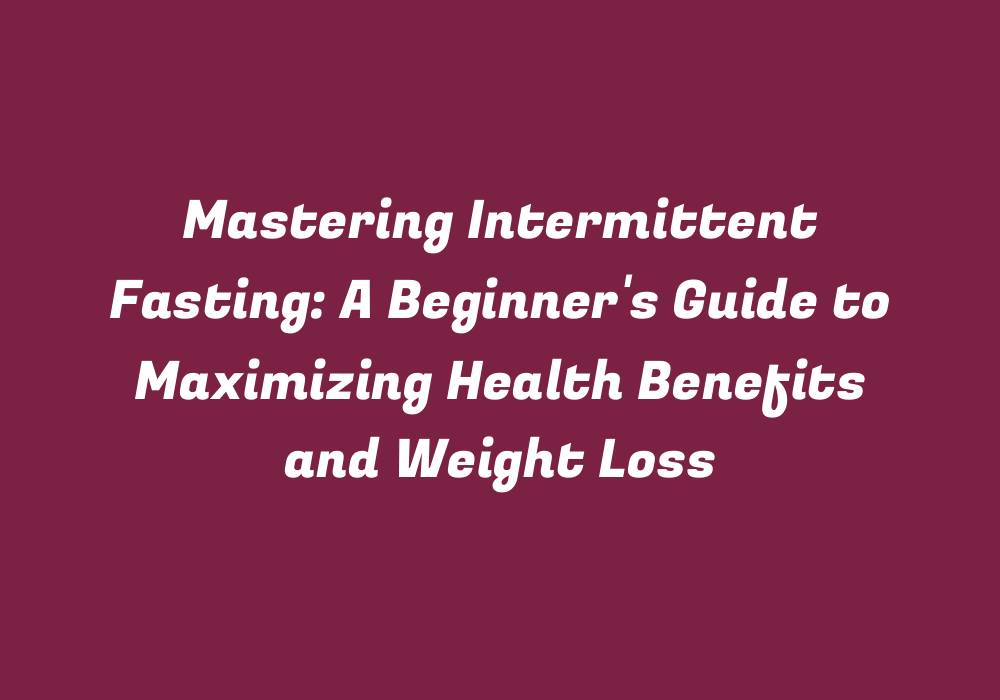Introduction
Intermittent fasting has gained immense popularity in recent years, not just among weight watchers but also health enthusiasts who aim to boost their overall well-being. It is a simple yet effective approach that revolves around eating within specific timeframes rather than restricting certain food items. The concept of intermittent fasting goes beyond mere weight loss and promises various other benefits for your body, mind, and spirit. In this beginner’s guide, we will explore the basics of this practice, outline its key elements, highlight some of the potential health advantages, and provide practical tips to help you embrace it effectively.
Understanding Intermittent Fasting
Intermittent fasting is not a specific diet but rather an eating pattern that involves alternating periods between eating and fasting. It doesn’t focus on which foods you should eat or avoid, making it less restrictive than other diets. The primary goal of intermittent fasting is to give your body a break from digestion by limiting your food intake during certain hours, allowing for more effective weight loss and enhanced health outcomes.
Key Elements of Intermittent Fasting
To begin with intermittent fasting, you need to determine the appropriate timeframes for eating and fasting. The most common approaches include:
1. Daily Time-Restricted Feeding (DTF): Also known as 16/8, this method involves restricting your eating window to 8 hours a day, leaving you with a 16-hour fasting period. It’s easy and effective for most people.
2. Alternate Day Fasting: This approach alternates between days of normal food intake and fasting days where only non-caloric beverages like water, tea, or coffee are consumed. The eating days should be followed by at least 36 hours without calories.
3. Periodic Intermittent Fasting: In this method, you consume your regular meals for several days in a week and then fast for one to two consecutive days during the week. You can choose any number of fasting days that suit you best.
Health Benefits of Intermittent Fasting
While weight loss is the primary motivation behind intermittent fasting, it offers a multitude of other benefits for your body. Some key advantages are:
1. Weight Management: Achieving calorie deficit through reduced food consumption and increased energy expenditure leads to fat burning and improved body composition.
2. Improved Metabolic Health: Fasting has been associated with enhanced insulin sensitivity, which aids in controlling blood sugar levels and reducing the risk of type 2 diabetes.
3. Enhanced Heart Health: Regular intermittent fasting can lower bad cholesterol (LDL) levels, reduce inflammation, and improve overall heart health.
4. Boosted Brain Function: Intermittent fasting stimulates the production of brain-derived neurotrophic factor (BDNF), which promotes cell growth and communication in the nervous system. This can lead to improved cognitive function, focus, and memory.
5. Reduced Risk of Chronic Diseases: Studies suggest that intermittent fasting may have protective effects against various health conditions such as cancer, Alzheimer’s disease, and Parkinson’s disease.
6. Better Gut Health: By allowing your gut to rest during the fasting period, it helps in improving digestion, reducing inflammation, and aiding healthy bacteria growth in the digestive system.
Tips for Beginners
Here are some practical tips to help you successfully incorporate intermittent fasting into your lifestyle:
1. Start Slowly: Gradually transition from your current eating habits by first extending the time between meals and gradually increasing the hours of fasting.
2. Stay Hydrated: Drink enough water, herbal tea, or black coffee during fasting periods to avoid dehydration and cravings.
3. Plan Your Meals: Make a schedule that outlines your eating and fasting times, making it easier to stick to your chosen intermittent fasting pattern.
4. Track Your Progress: Monitor your weight loss journey using tools like a food journal or fitness apps to stay motivated and make adjustments if needed.
5. Stay Consistent: Regularly practicing intermittent fasting will help you become more comfortable with the process, which eventually leads to better adherence and enhanced health outcomes.
6. Seek Support: Share your journey with friends or family who are also interested in intermittent fasting or join an online community for motivation and advice.
7. Listen to Your Body: Pay attention to any potential side effects like fatigue, headaches, or dizziness during the initial stages. Gradually adjust your approach if needed to ensure a smooth transition.
Conclusion
Mastering intermittent fasting requires patience and dedication as you work towards maximizing its health benefits. By understanding the key elements of this eating pattern and focusing on your individual needs, you can unlock various advantages beyond weight loss for overall wellness improvement. With commitment and consistency, intermittent fasting can become a powerful tool to boost your health and achieve better body composition. So, embark on this exciting journey and discover how it transforms your life both inside and out.
